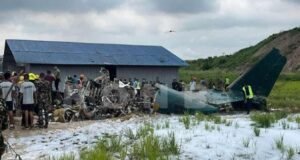
Lalitpur, 24 September: A two days training course on “Empowering women to adapt climate change effects for sustainable growth” was held at the Local Development Training Academy, Lalitpur district, Nepal on 23-24 September 2018.
The training course was organised as a part of the on-going project of European based BASUG diaspora development organisation in collaboration with its local partner SOLVE Nepal and with the support of the German International Development Cooperation GIZ and CIM. A total of 68 women representatives from different cooperatives and women communities took part in the training course.
Country Coordinator of CIM in Nepal, Pasma Dahal attended the closing ceremony as chief guest, while Executive Director of SOLVE Nepal Rajendra Bahadur Pradhan was in the Chair. BASUG Chairman Bikash Chowdhury Barua from the Netherlands and Country Coordinator of BASUG UK Ansar Ahmed Ullah addressed the session as special guests. Project Coordinator of BASUG Germany AHM Abdul Hai addressed the function as guest speaker.

CIM Country Coordinator Dahal in her speech stressed on the need for active engagement of women in climate adaptation for the betterment of society. She also expressed great concern about the vulnerability of the women and people living in rural areas which are highly affected by the negative impact of the climate change in Nepal. She highlighted the significance of the training and capacity building initiatives as she has herself visited and observed the harsh reality of climate hazards in rural areas.
Expert on Climate Adaptation Sohan Shrestha, Social Development Officer of SOLVE Nepal Nara Maya Rana and District Project Coordinator of Susasan Project of SOLVE Nepal Pratigya Neupane facilitated sessions in the training. Financial Officer of SOLVE Nepal Namita Shrestha, Field Coordinators of SOLVE Nepal Basna Maya Morpa and Yadab Nepal were also present at the training event among others.
BASUG Chairman Bikash Chowdhury Barua in his speech as special guest said, women are always neglected in the family and society in Asian countries. They work hard and even at the risk of their own lives in the natural calamities but their rights are ignored. Because of the natural calamities in Nepal food scarcity is one of the threats. So, through these training courses women beneficiaries have learnt how to grow vegetables and crops through alternative ways to ensure food security on one hand and empowering themselves in the long run.
A documentary film made by SOLVE-Nepal on climate change adaptation and women empowerment was also screened. The objective of the training course was to create awareness and to increase the skills of unprivileged women, youth and local development activists on climate change adaptation for the sustainable growth and food security in Nepal. Another training course for the women beneficiaries will be held in Kathmandu this year and two more training sessions will be held in Lalitpur and Kathmandu in the second phase in 2019 following the first phase of the training. Another advocacy workshop will be organised in Berlin, Germany in 2019.
 Weekly Bangla Mirror | Bangla Mirror, Bangladeshi news in UK, bangla mirror news
Weekly Bangla Mirror | Bangla Mirror, Bangladeshi news in UK, bangla mirror news







